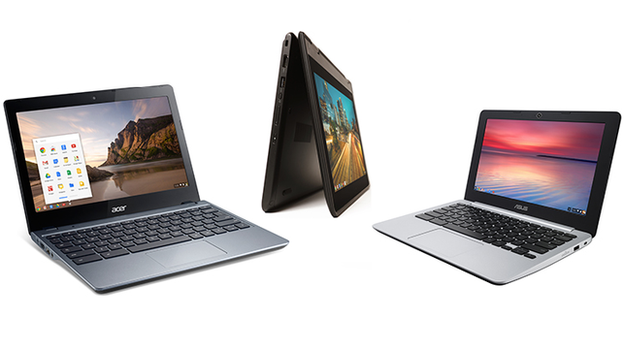Windows PCs seek revival at Computex tech show
- Published
Cindy Sui reports from Computex
The problem with being in the tech business is that it's easy to get left behind.
The rise of smartphones, then tablets and Google's Chromebooks and now the first wearable tech, have threatened to send shipments of Windows laptops and desktops adrift.
PC shipments slumped by about 10% between 2012 and 2013, according to research firm Gartner.
But recent data from the firm suggests the beginnings of a turnaround, external with many of the major manufacturers reporting rising demand for their Windows PCs, even if sales remain substantially below where they were two years ago.
Microsoft's phasing out of Windows XP has helped, but innovations including detachable keyboards, longer battery life and touchscreens have also played a role.
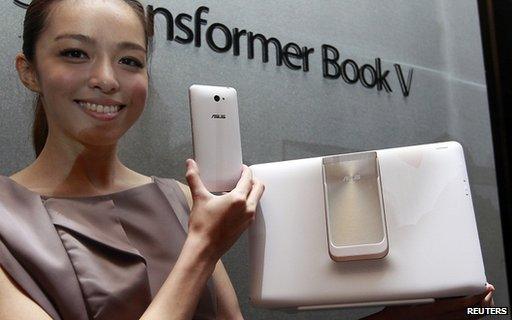
The Transformer Book V runs Android apps if a phone is plugged into the Windows hybrid
Taiwan's Computex - which has just got under way - has long been a good place to get a first peek at PC-makers' latest hardware.
The tech trade show - Asia's biggest - provides an opportunity for manufacturers to gauge reactions to what are sometimes "out there" designs before deciding which devices to throw production and marketing budgets behind.
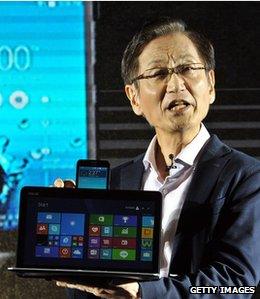
Asus's president says the Transformer Book V is the "perfect device for multitaskers"
Perhaps the oddest machine at this year's show is one by Asus.
The Transformer Book V laptop-tablet hybrid features a dock on the back of its screen into which a smartphone can be plugged.
The design allows the device to either run off its own processor or the handset's chip, in a bid to give its owner the best of every possible world.
"The tablet can be used independently and when combined with a keyboard dock turns into an Android laptop, and with the switch of a key will turn into a powerful Windows laptop for ultimate productivity," explains Jonney Shih, chief executive and president at Asus.
Not everyone is convinced it's ready to go mass market.
"It's very much a niche product," says Chris Green, a tech analyst at the Davies Murphy Group consultancy.
"It's not entirely clear what gap Asus is trying to fill, but if the firm is not looking for it to sell in high volumes, then it may well work in a limited space."
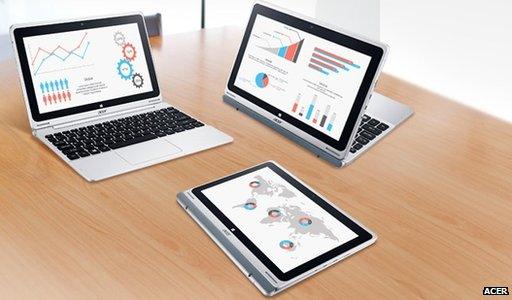
Acer's Aspire Switch 10 allows its screen to be attached to its base in a variety of ways
Acer's Aspire Switch 10 - which is also on show - might not be quite as radical a design but its introduction of magnetic "snap hinges" - that connect the tablet-laptop hybrid's keyboard to its screen - impress by allowing the display to be flipped to face whichever way the user prefers.
The firm has sold 160,000 units of the machine since it launched last month, reveals business manager Richmond Cheng, who adds that Acer plans to launch a "cost-down" version by August.
Ultra high-definition screens
One of the other technologies being promoted at the show are Windows computers that feature higher-than-normal-definition screens.
Gigabyte is showing off a Windows laptop with a "3K" display - representing a 3,200 x 1,800-pixel resolution - that promises sharper, more detailed graphics, albeit at a cost to battery life.
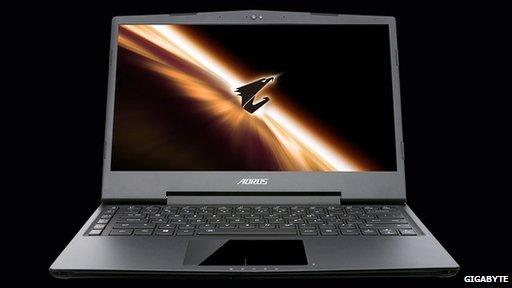
Gigabyte's Aorus X3 laptop's 3K display means its battery only lasts three to four hours
Asus and Toshiba have gone one better with 4K (3,840 x 2,160-pixel) displays on their Zenbook NX500 and Toshiba Satellite P50t laptops - four times the resolution of a standard 1080p "full HD" screen.
For now the high cost of the machines mean they are being marketed at gamers and other early adopters. But when prices fall, expect such technology to be targeted at photographers, video-makers and those wanting to fit as much legible content as possible on their screen.
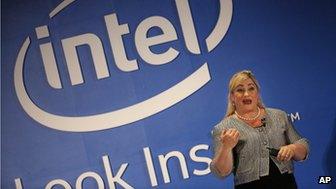
Intel and Samsung announced they are to work together to make cheaper all-in-one 4K desktop PCs
Consumers willing to go for a less portable solution are being promised that 4K desktops could soon tumble in price.
Samsung - a leading monitor panel maker - and Intel have announced they are collaborating on a way to cut costs, a move they suggest could soon lower the price of all-in-one 4K desktop PCs by more than half to as low as $999 (£597).
64-bit Android phone
But while there is lots of new Windows-related kit at Computex, many of the announcements have focused on Google's mobile OS.
Taiwan's Acer is promoting its new Android tablet, the 8in Iconia Tab 8, as well as five new Android smartphones.
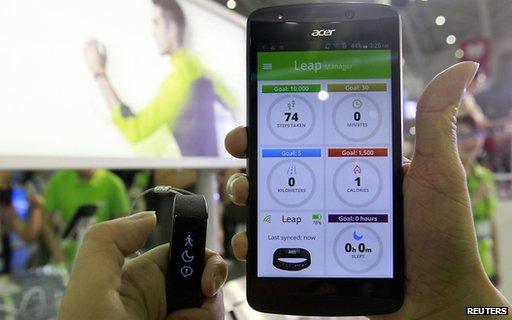
Acer unveiled its new Android-powered Liquid Jade, which is bundled with a smartwatch
Asus unveiled new Fonepad handsets, including its first to boast a 64-bit processor - a feature the device uses special software to take advantage of, since Android itself is still built with 32-bit code.
And HP confirmed the existence of a new Android laptop.
The 14in wasp-coloured Slatebook cannot be detached from its keyboard, unlike the firm's last Android product that went by the same brand name.
The $399 price may attract some - but it's a real question why shoppers wouldn't opt for a tablet and keyboard or Chromebook instead.
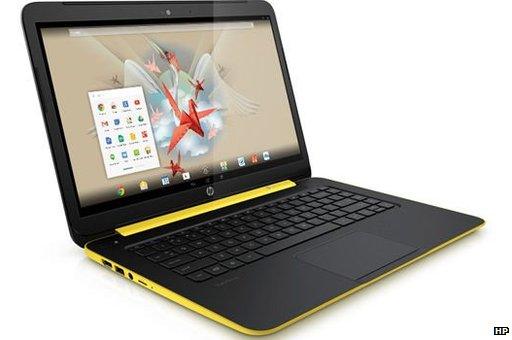
HP has taken the unusual step of making an Android laptop that cannot be turned into a tablet
Even so, Mr Green suggests it will be innovations around Android and not Windows that will take the upper hand at Computex and other computer trade shows in the years to come.
"Windows still has a place right now because of the size of the installed user-base, but there is nothing to suggest at the moment that it will continue to retain as dominant a place in the medium to long-term," he says.
"The so-called recovery in Windows device sales is a blip, an attempt almost to jump-start interest.
"But with the increases in performance and power efficiency that we're seeing from Android devices, they will pose an increasing threat to the conventional computing platforms."
- Published3 June 2014
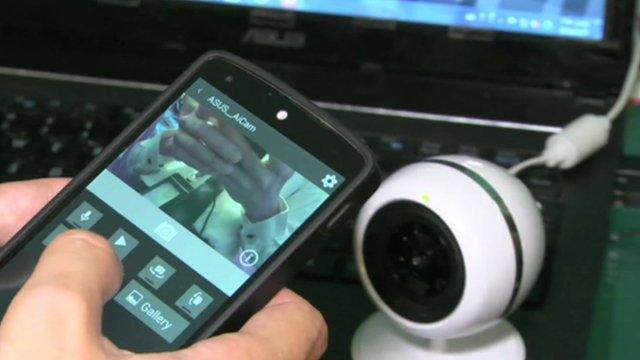
- Published2 June 2014
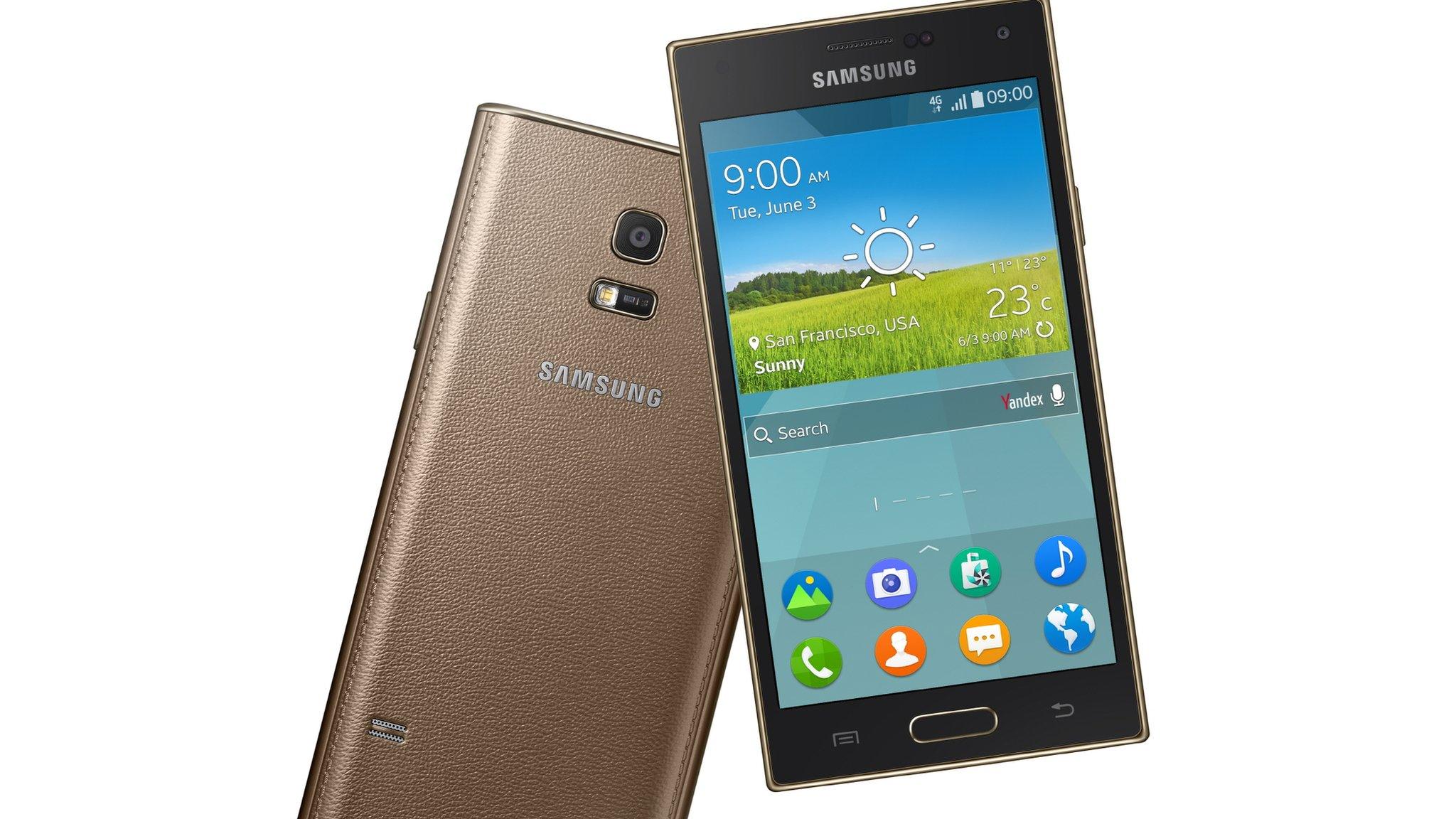
- Published6 May 2014
